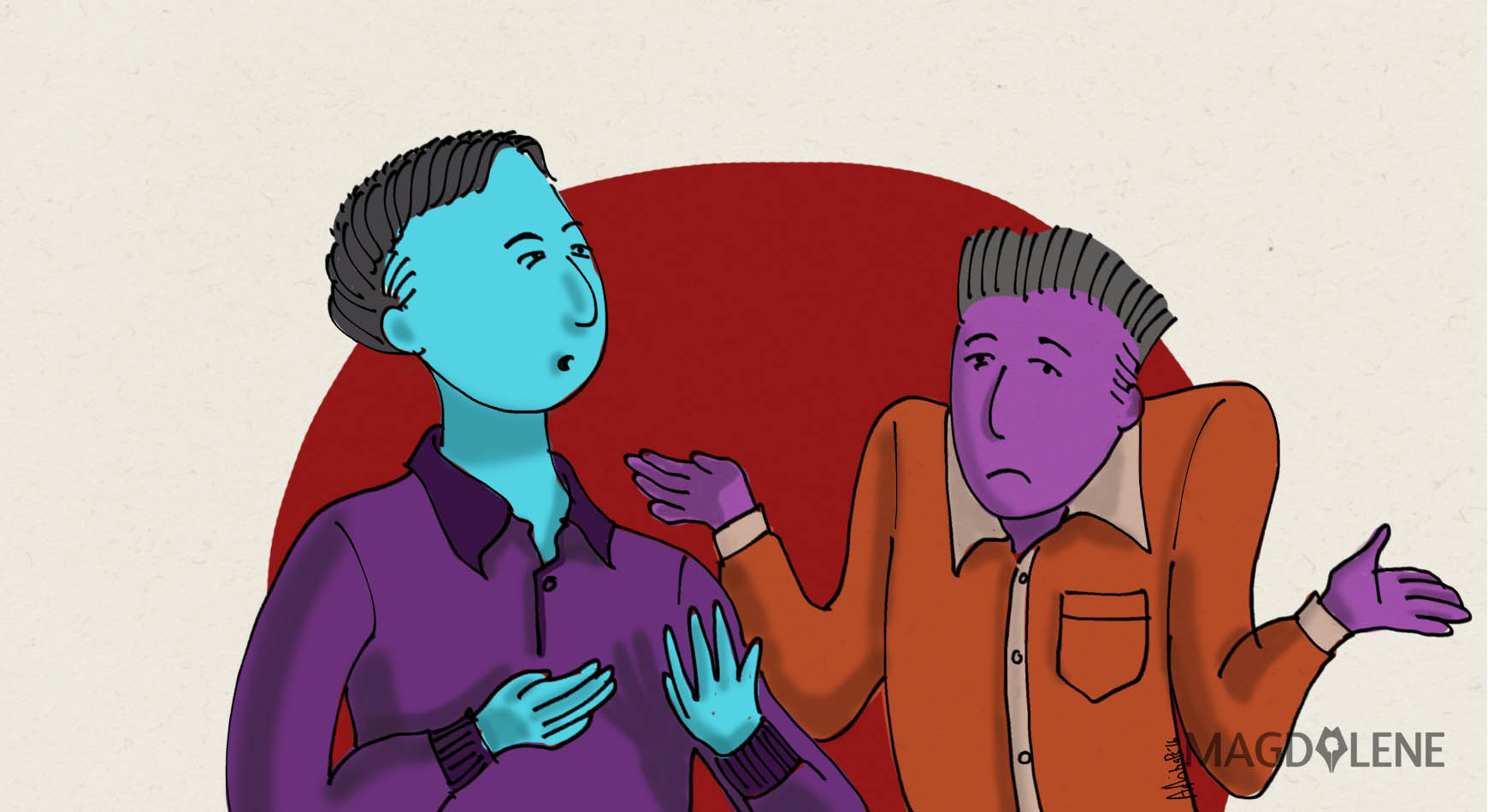I had it pretty lucky, born into a middle class Catholic family. Going to Catholic school means going to a school dominated by Chinese-Indonesians, a phenomenon that started just in 1970s in the aftermath of the mid-1960s’ anti-communist purge that drove mass conversions of ethnic Chinese into Christianity. Many of my classmates came from the working class – children of shopkeepers, bank clerks, or garage owners. Those who came from the upper middle class did a good job of concealing their family backgrounds.
In school I was a majority. A Catholic boy who passed as a Chinese (from name and skin tone) and a Javanese (from attitude and family experience). It was my personality, rather than my identity, that placed me at the bottom of the school’s social food chain.
The anti-Chinese sentiment in Indonesia rose in mid-1990s, as people grew tired of Suharto and his cronies (Javanese and Chinese alike), your favourite malls were built, and hard line Islamic thoughts grew popular in Indonesia. Like many other Christians, I saw the tensions as driven by religions, not ethnicities. May 1998 riots and the Reformasi made me embraced my Chinese identity, especially after the Habibie government tried to silence allegations of mass rapes and gruesome murders perpetrated on Chinese women.
In Australia I lived close to the Chinatown, next to Chinese-Malaysian students, and I went to an English preparation course where my classmates were Chinese people from all across Asia – Thailand, Vietnam, Taiwan, Hong Kong, and China. The Thais and Vietnamese had similar experience: they could not read Chinese text and had to use Thai and Vietnamese names (even given names. We Indonesians have it easier).
I finally met more Indonesians in diploma and university, while also socialized with students from different nationalities and ethnicities. At first it was a sobering experience: the Kalimantan Chinese are more comfortable speaking English or Chinese over Indonesian, and are not comfortable with Indonesians from Java, whatever their ethnicity is.
Many Javanese Jakartans looked down on me, and those who ended up being good friends admitted they had bad first impression of me because I’m Chinese (I’m not sure if things warmed up after they saw my Javanese side). I had bad experiences with Asian-Australians in diploma, but met wonderful people in university. Many international students avoided Asian-Australians at all, believing that they are white-wannabe snobs.
Meanwhile, I fell in love with Indonesia again. The economy had bounced back in 2002, a new wave of East Asian pop culture came with the Taiwanese hit TV drama Meteor Garden and the popularity of Japanese pop music among college students, and suddenly Indonesians were interested with the Chinese culture. Confucianism was accepted as an official religion and the Chinese New Year was made a national holiday. Back home I bought books on Chinese culture, Taiwanese pop CDs that were finally legal (the Chinese culture was banned before I was born), followed Metro Xin Wen news, and idolized Seno Gumira Ajidarma who wrote short stories and essays on Chinese-Indonesians during and after May 1998. In my view, Indonesia could move toward the “racial harmony” of Malaysia (Malaysian readers: I know).
In university I also found Japanese animation and comics, where finally Asians can become heroes, a pair of Asians can become lovers, and daily lives of Asians are explored without being made exotic (yes, this is a snide on Hong Kong-goes-Hollywood movies like Rush Hour 2 and Cradle 2 the Grave). The anime club members consisted of two groups, nerdy white guys and Asian-Australian girls who also looked for the pan-Asian cultural expression.
For some years, I was successful in branding myself as The Proud Asian Guy™. I would come to lectures wearing an anime or Indonesian souvenir t-shirt, giving the Asian perspective to a discussion, hanging out with Indonesian students in the campus’ Chinese restaurant, watching anime with the Australians, dating in Chinatown, and talking about Indonesian politics online.
Perhaps I enjoyed being a special snowflake. I was the only Asian in my major. I was the only Chinese-Indonesian who enjoyed talking about any politics. I was the only Asian guy in the anime club. I was the only Chinese-Indonesian who had great faith in Indonesia and didn’t hate the Muslims. I had some troubles with other Chinese-Indonesians for rooting for SBY (Susilo Bambang Yudhoyono) instead of Megawati Soekarnoputri in 2004.
The May 98 riots had become a personal obsession. I wanted to know why it happened. Who masterminded it. Why so many people seemed to hate the Chinese so much. Why the mass rapes had to happen. Luckily, all available subjects on Indonesia touched on Chinese-Indonesian issues, since many scholars of Indonesian Studies believe it’s impossible to study Indonesia (or any Southeast Asian nation) without studying the local Chinese. I got to know everything about Indonesia from these Australians, including on the Chinese-Indonesians.
The SBY administration ended my happy days. Friends were graduating and I couldn’t make new ones. Later on I learned that by mid-2000s, Asian countries like China and Malaysia offered strong competitions to Australia for international students, and Chinese-Indonesians had become cautious again with their identities. Studying the Holocaust to compare anti-Semitism in Europe to anti-Chinese sentiments in Southeast Asia did not help my mental health either.
Some friends suggested that perhaps most Indonesians in Australia came from rich families and that was why I could not connect with them. Perhaps I would find better friends, and romance, back home where there are more similar kind of people.
You might’ve heard this story before. Last year I came to accept my biracial identity, and on this Chinese New Year’s week (and month) I’m tackling the harder question of feeling rejected by other Chinese-Indonesians, all while hoping of being a part of the community. In the upcoming Part 2 I would tell why the quest is so hard – and by straying from my path, I’ve found new friends.
*Illustration by aotaro
Read Mario’s thoughts on Taiwan’s new female president.









Comments